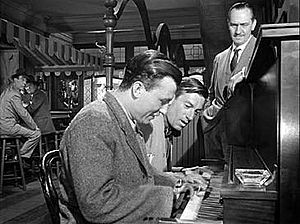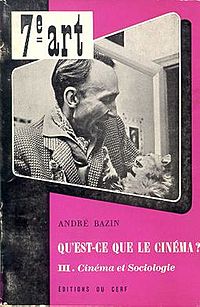André Bazin facts for kids
André Bazin (18 April 1918 – 11 November 1958) was a very important French film critic and film theorist. He helped start a famous film magazine called Cahiers du cinéma in 1951.
Bazin believed that movies should show reality as it is. He thought that viewers should be free to interpret what they see. This idea was different from other film theories at the time.
Contents
André Bazin's Life Story
André Bazin was born in Angers, France, in 1918. He married Janine Kirsch in 1949. They had a son named Florent. Bazin sadly passed away in 1958 at age 40. He had leukemia, a type of cancer.
Bazin's Ideas on Film
Bazin started writing about movies in 1943. He was a co-founder of the important film magazine Cahiers du cinéma in 1951. He worked with Jacques Doniol-Valcroze and Joseph-Marie Lo Duca. Bazin was a big influence on film studies after World War II. He edited Cahiers until he died. After his death, a collection of his writings was published. It was called Qu'est-ce que le cinéma? (What is cinema?).
Showing Reality in Movies
Bazin believed that movies should show "objective reality." This means showing things as they truly are. He liked films that looked like documentaries. He also admired movies from the Italian neorealism style. These films showed everyday life in a very real way.
Bazin thought filmmakers should use deep focus. This technique keeps everything in the shot clear, both close up and far away. He also liked wide shots and "shot-in-depth." These methods let the viewer see more of the scene. He preferred this "true continuity" over fancy editing tricks.
For example, Bazin studied a scene in the movie The Best Years of Our Lives. In this scene, the main action happens in the background. But the foreground is also interesting. Bazin said this makes the viewer more involved. They have to actively look around the screen. This lets them decide what is most important.

Viewer's Freedom in Film
Bazin's focus on reality and deep focus was important. It showed his belief that viewers should interpret a film themselves. He thought the director should not control the viewer's thoughts too much. This idea was different from earlier film theories. Those theories often focused on how movies could change reality.
Influences on Bazin's Thinking
Some experts say that Roman Catholicism and Personalism influenced Bazin. Personalism is a way of thinking that focuses on the importance of each person. These ideas shaped his view of "realism." He saw realism as more than just showing physical things. It was about a deeper, more meaningful reality.
Another expert, Tom Gunning, suggests Hegelianism also influenced Bazin. Hegel was a philosopher. Gunning thought Bazin's love for the long take was like Hegel's idea of history unfolding. However, some people disagree with this idea. Bazin liked long takes for freedom. Hegel's ideas were about a very organized system.
The Auteur Theory
Bazin's personal beliefs led him to think that a film should show the director's unique vision. This idea was very important for the auteur theory. The auteur theory says that the director is the "author" of a film. They are the main creative force.
Bazin's student, François Truffaut, wrote an article about this idea. Bazin published it in Cahiers in 1954. Bazin also supported directors like Howard Hawks, William Wyler, and John Ford. He saw them as true "auteurs."
See Also
 In Spanish: André Bazin para niños
In Spanish: André Bazin para niños
- Invisible auditor
 | Leon Lynch |
 | Milton P. Webster |
 | Ferdinand Smith |


